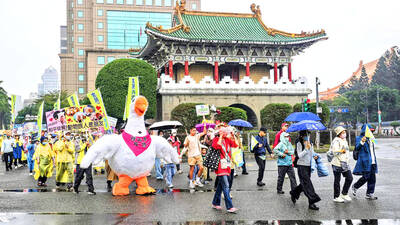The Council of Agriculture (COA) yesterday decided to remove Formosan rock macaques and seven other species from its list of protected species, while adding 17 species to it.
The council’s Forestry Bureau yesterday convened a five-hour meeting with experts to discuss the classification of wildlife, with the protection status of macaques being one of the most heatedly debated issues.
Among the 17 species being added to the list are the Taiwan rosefinch, the long-tailed pigeon and the Formosan yuhina, the bureau said.
GENERAL WILDLIFE
Eight formerly protected species, including the macaques, the Formosan Reeve’s muntjac and the masked palm civet have been reclassified as general wildlife, it said.
“The decision has nothing to do with agricultural losses [caused by animals], which is another issue,” bureau Director-General Lin Hwa-ching (林華慶) said, adding that the living conditions and distribution of wildlife are the bureau’s main concerns.
The bureau would also initiate monitoring plans for those species, Lin added.
A study in 2000 suggested that there were between 250,000 and 300,000 macaques, while other evidence suggests that their number has been growing steadily, said National Tunghai University Department of Life Sciences professor Lin Liang-kong (林良恭), who attended the meeting.
However, a more comprehensive survey about the species’ living conditions is needed, he added.
FARM RAIDS
While many farmers have complained about monkey raids, only a few of them have harmed the animals, because they think the macaques look like humans, Lin Liang-kong said, adding that experts have been helping farmers install electric fences around their farms to keep out wild animals.
People who hunt protected animals could face a prison term of between six months and five years or a fine between NT$200,000 and NT$1 million (US$6,577 and US$32,891) for breaching the Wildlife Conservation Act (野生動物保育法), bureau Conservation Division Director Hsia Jung-sheng (夏榮生) said.
People who hunt non-protected animals could face a fine of between NT$60,000 and NT$300,000 under the act, she said.
The bureau needs to finish related paperwork before it can formally announce the changed protection statuses of wildlife, Hsia added.

NUMBERS IMBALANCE: More than 4 million Taiwanese have visited China this year, while only about half a million Chinese have visited here Beijing has yet to respond to Taiwan’s requests for negotiation over matters related to the recovery of cross-strait tourism, the Tourism Administration said yesterday. Taiwan’s tourism authority issued the statement after Chinese-language daily the China Times reported yesterday that the government’s policy of banning group tours to China does not stop Taiwanese from visiting the country. As of October, more than 4.2 million had traveled to China this year, exceeding last year. Beijing estimated the number of Taiwanese tourists in China could reach 4.5 million this year. By contrast, only 500,000 Chinese tourists are expected in Taiwan, the report said. The report

Temperatures are forecast to drop steadily as a continental cold air mass moves across Taiwan, with some areas also likely to see heavy rainfall, the Central Weather Administration (CWA) said. From today through early tomorrow, a cold air mass would keep temperatures low across central and northern Taiwan, and the eastern half of Taiwan proper, with isolated brief showers forecast along Keelung’s north coast, Taipei and New Taipei City’s mountainous areas and eastern Taiwan, it said. Lows of 11°C to 15°C are forecast in central and northern Taiwan, Yilan County, and the outlying Kinmen and Lienchiang (Matsu) counties, and 14°C to 17°C

STEERING FAILURE: The first boat of its class is experiencing teething issues as it readies for acceptance by the navy, according to a recent story about rudder failure The Hai Kun (海鯤), the nation’s first locally built submarine, allegedly suffered a total failure of stern hydraulic systems during the second round of sea acceptance trials on June 26, and sailors were forced to manually operate the X-rudder to turn the submarine and return to port, news Web site Mirror Daily reported yesterday. The report said that tugboats following the Hai Kun assisted the submarine in avoiding collisions with other ships due to the X-rudder malfunctioning. At the time of the report, the submarine had completed its trials and was scheduled to begin diving and surfacing tests in shallow areas. The X-rudder,

DEMAND: The government should enact regulations in line with Austria and Germany to incorporate vegan nutrition into school meals, an advocate said More than 1,000 people yesterday marched in Taipei to promote veganism, calling for legislation to incorporate vegan diets into school lunches and the national net zero emissions program. Participants gathered on Ketagalan Boulevard in front of the Presidential Office Building for the march, which was organized by the Vegan Action Network (VAN). Former ambassador to Chad Chiu Chung-jen (邱仲仁), actor Yankee Yang (楊子儀) and actress Cindy Lien (連俞涵) attended the event. VAN member Marianne Chao (趙梅君) said that the campaign aimed to urge the government to promote vegan diets across schools and government agencies via legislation and national policies, which would help build